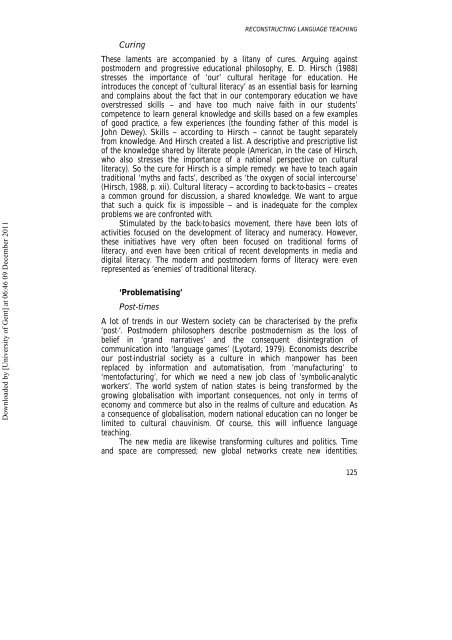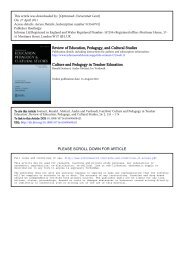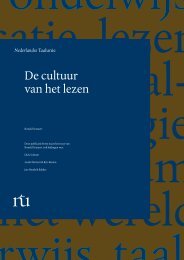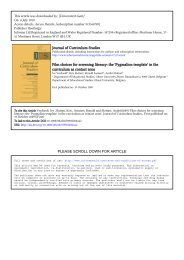a view informed by the problems of traditional literacy in a digital age
a view informed by the problems of traditional literacy in a digital age
a view informed by the problems of traditional literacy in a digital age
Create successful ePaper yourself
Turn your PDF publications into a flip-book with our unique Google optimized e-Paper software.
Downloaded <strong>by</strong> [University <strong>of</strong> Gent] at 06:46 09 December 2011<br />
Cur<strong>in</strong>g<br />
RECONSTRUCTING LANGUAGE TEACHING<br />
These laments are accompanied <strong>by</strong> a litany <strong>of</strong> cures. Argu<strong>in</strong>g aga<strong>in</strong>st<br />
postmodern and progressive educational philosophy, E. D. Hirsch (1988)<br />
stresses <strong>the</strong> importance <strong>of</strong> ‘our’ cultural herit<strong>age</strong> for education. He<br />
<strong>in</strong>troduces <strong>the</strong> concept <strong>of</strong> ‘cultural <strong>literacy</strong>’ as an essential basis for learn<strong>in</strong>g<br />
and compla<strong>in</strong>s about <strong>the</strong> fact that <strong>in</strong> our contemporary education we have<br />
overstressed skills – and have too much naive faith <strong>in</strong> our students’<br />
competence to learn general knowledge and skills based on a few examples<br />
<strong>of</strong> good practice, a few experiences (<strong>the</strong> found<strong>in</strong>g fa<strong>the</strong>r <strong>of</strong> this model is<br />
John Dewey). Skills – accord<strong>in</strong>g to Hirsch – cannot be taught separately<br />
from knowledge. And Hirsch created a list. A descriptive and prescriptive list<br />
<strong>of</strong> <strong>the</strong> knowledge shared <strong>by</strong> literate people (American, <strong>in</strong> <strong>the</strong> case <strong>of</strong> Hirsch,<br />
who also stresses <strong>the</strong> importance <strong>of</strong> a national perspective on cultural<br />
<strong>literacy</strong>). So <strong>the</strong> cure for Hirsch is a simple remedy: we have to teach aga<strong>in</strong><br />
<strong>traditional</strong> ‘myths and facts’, described as ‘<strong>the</strong> oxygen <strong>of</strong> social <strong>in</strong>tercourse’<br />
(Hirsch, 1988, p. xii). Cultural <strong>literacy</strong> – accord<strong>in</strong>g to back-to-basics – creates<br />
a common ground for discussion, a shared knowledge. We want to argue<br />
that such a quick fix is impossible – and is <strong>in</strong>adequate for <strong>the</strong> complex<br />
<strong>problems</strong> we are confronted with.<br />
Stimulated <strong>by</strong> <strong>the</strong> back-to-basics movement, <strong>the</strong>re have been lots <strong>of</strong><br />
activities focused on <strong>the</strong> development <strong>of</strong> <strong>literacy</strong> and numeracy. However,<br />
<strong>the</strong>se <strong>in</strong>itiatives have very <strong>of</strong>ten been focused on <strong>traditional</strong> forms <strong>of</strong><br />
<strong>literacy</strong>, and even have been critical <strong>of</strong> recent developments <strong>in</strong> media and<br />
<strong>digital</strong> <strong>literacy</strong>. The modern and postmodern forms <strong>of</strong> <strong>literacy</strong> were even<br />
represented as ‘enemies’ <strong>of</strong> <strong>traditional</strong> <strong>literacy</strong>.<br />
‘Problematis<strong>in</strong>g’<br />
Post-times<br />
A lot <strong>of</strong> trends <strong>in</strong> our Western society can be characterised <strong>by</strong> <strong>the</strong> prefix<br />
‘post-‘. Postmodern philosophers describe postmodernism as <strong>the</strong> loss <strong>of</strong><br />
belief <strong>in</strong> ‘grand narratives’ and <strong>the</strong> consequent dis<strong>in</strong>tegration <strong>of</strong><br />
communication <strong>in</strong>to ‘langu<strong>age</strong> games’ (Lyotard, 1979). Economists describe<br />
our post-<strong>in</strong>dustrial society as a culture <strong>in</strong> which manpower has been<br />
replaced <strong>by</strong> <strong>in</strong>formation and automatisation, from ‘manufactur<strong>in</strong>g’ to<br />
‘ment<strong>of</strong>actur<strong>in</strong>g’, for which we need a new job class <strong>of</strong> ‘symbolic-analytic<br />
workers’. The world system <strong>of</strong> nation states is be<strong>in</strong>g transformed <strong>by</strong> <strong>the</strong><br />
grow<strong>in</strong>g globalisation with important consequences, not only <strong>in</strong> terms <strong>of</strong><br />
economy and commerce but also <strong>in</strong> <strong>the</strong> realms <strong>of</strong> culture and education. As<br />
a consequence <strong>of</strong> globalisation, modern national education can no longer be<br />
limited to cultural chauv<strong>in</strong>ism. Of course, this will <strong>in</strong>fluence langu<strong>age</strong><br />
teach<strong>in</strong>g.<br />
The new media are likewise transform<strong>in</strong>g cultures and politics. Time<br />
and space are compressed; new global networks create new identities;<br />
125





